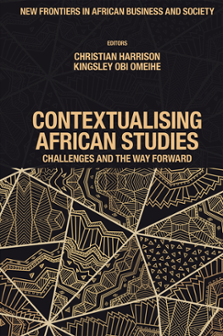
Index
Contextualising African Studies: Challenges and the Way Forward
ISBN: 978-1-80455-339-8, eISBN: 978-1-80455-338-1
Publication date: 12 December 2023
Citation
(2023), "Index", Harrison, C. and Omeihe, K.O. (Ed.) Contextualising African Studies: Challenges and the Way Forward (New Frontiers in African Business and Society), Emerald Publishing Limited, Leeds, pp. 215-224. https://doi.org/10.1108/978-1-80455-338-120231015
Publisher
:Emerald Publishing Limited
Copyright © 2024 Christian Harrison and Kingsley Obi Omeihe
INDEX
(see also Organisational trust)
- Prelims
- Chapter 1: Introduction to Contextualising African Studies: Challenges and the Way Forward
- Part One: Business
- Chapter 2: Contextualising Female Entrepreneurship and Financial Inclusion in Nigeria
- Chapter 3: A Structured Framework Linking Corporate Governance, Institutional Logics and Organisational Trust: A Call for An African Focus
- Chapter 4: Challenges of Sustainability Practices: Evidence From a Gold Mining Multinational Enterprise in Ghana
- Chapter 5: The Unique Utility of Informal Institutions in Sub-Saharan Africa: A Study of Self-Employment Embedded in Culture and Context
- Part Two: Society
- Chapter 6: Knowledge Sharing and Transfer (KST) That Really Works: An Exploration of KST in Sub-Saharan South African Public Sector Institution
- Chapter 7: Developmental Strategy for Agriculture in Nigeria
- Chapter 8: Notes on Historical Perspectives of Traditional Markets and Market Authority in African Systems: Evidence From Nigeria
- Chapter 9: Is Tourism Regulation Catalyst for Abuja FCT Nigeria Hotels Business Performance Innovation?
- Chapter 10: Contextualising Entrepreneurship: A Call for More African Research
- Index